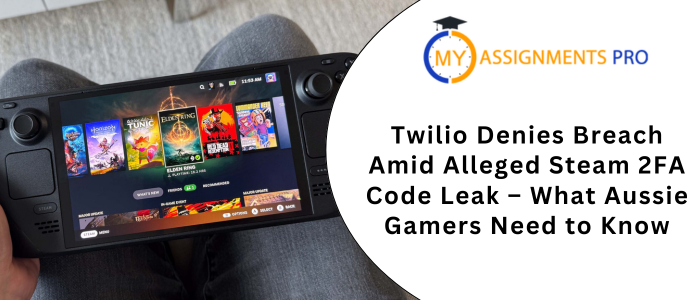
In the world of gaming, security and data privacy are critical concerns, especially for platforms like Steam, which boasts over 120 million active monthly users globally. Recently, whispers of a potential security breach involving Steam and the communications giant Twilio have sparked discussions among gamers, including Australia’s vibrant gaming community. Here’s what you need to know about the situation and why it matters for Aussie gamers.
What Sparked the Breach Rumours?
The controversy began when a threat actor known as Machine1337 (also known as EnergyWeaponsUser) claimed to have accessed over 89 million Steam user records, including one-time access codes. The individual listed this data for sale, reportedly asking for $5,000, suggesting a significant compromise of user information.
Security-focused news outlet BleepingComputer reported that the leaked files, comprising about 3,000 records, contained historic SMS messages with one-time passcodes (OTPs) for Steam. These messages included the recipients’ phone numbers, raising immediate concerns about data privacy and account security.
Who Are the Key Players?
Steam, owned by the US-based Valve Corporation, is the world’s largest digital distribution platform for PC games, and it’s a household name among Australian gamers. Meanwhile, Twilio is a prominent cloud communications company known for its robust API services that handle SMS, voice calls, and two-factor authentication (2FA) messages. Many popular platforms, including Steam, rely on Twilio for sending security codes to users.
Twilio’s Official Response
Twilio quickly responded to the allegations, issuing a statement to BleepingComputer. The company firmly denied that its systems had been breached. In their response, a Twilio spokesperson stated, “Twilio takes these threats very seriously and is reviewing the alleged incident. We will provide more information as it becomes available.”
Twilio later clarified that, upon closer inspection, their systems remained secure, reinforcing that they were not the source of the leak. This assurance is critical, as Twilio’s services are widely used for 2FA, a crucial security feature for gaming accounts and other online platforms.
Potential Source of the Leak
Despite Twilio’s assurances, the leaked data still raised red flags. Independent journalist MellowOnline1, known for monitoring abuse and fraud within the Steam community through the SteamSentinels group, suggested a different theory. They speculated that the breach might have originated from a supply-chain compromise, potentially involving a third-party SMS provider that intermediates messages between Twilio and Steam users.
Evidence from the leaked files indicated real-time SMS log entries from Twilio’s backend, hinting at the possibility of a compromised admin account or API key misuse. However, these claims remain unverified, and BleepingComputer noted that it could not definitively trace the data to a single source.
What Does This Mean for Australian Gamers?
For Australian gamers, this incident highlights the importance of securing online accounts. While Steam has reassured users that their systems have not been breached, the risk of compromised SMS messages could still pose a threat if they fall into the wrong hands.
To bolster security, Steam users are encouraged to use the Steam Guard Mobile Authenticator, which provides a more robust layer of protection than SMS-based codes. This method reduces the risk of unauthorised access, even if a one-time passcode is intercepted.
Keeping Your Accounts Safe – Practical Tips for Aussies
Here are some practical steps Australian gamers can take to enhance their account security:
- Enable Two-Factor Authentication (2FA): Use the Steam Guard Mobile Authenticator instead of SMS-based 2FA for added security.
- Regularly Monitor Account Activity: Keep an eye on your account for unusual login attempts or unexpected activity.
- Use Strong, Unique Passwords: Avoid using the same password across multiple sites and consider using a password manager.
- Beware of Phishing Attempts: Be cautious of messages or emails that ask for your account details or prompt you to click unfamiliar links.
- Stay Informed: Keep up with the latest security news and updates from platforms like Steam and Twilio to stay ahead of potential threats.
Final Thoughts
While the full scope of this incident is still unclear, it serves as a timely reminder for gamers to prioritise their digital security. As online gaming continues to grow in popularity in Australia, safeguarding personal data should be a top priority.
In the meantime, Australian Steam users can take comfort in the fact that neither Twilio nor Steam has confirmed a direct breach of their core systems, meaning your game library is likely still secure – but a little extra caution never hurts.
Stay safe, and happy gaming!
Fast, Affordable, and Professional Assignment Help
Overwhelmed by tight deadlines and a growing pile of assignments? Our expert assignment help service is here to lighten your load. Whether you’re studying business, law, nursing, finance, or any other subject, we provide 100% original, thoroughly researched work, tailored to your university’s specific guidelines. Enjoy fast delivery, complete confidentiality, and budget-friendly pricing, with exclusive discounts for bulk orders. Let us handle the hard work, so you can focus on what truly matters. Get in touch today for top-notch assignment help!
Source
Mitchell
Mitchell is a seasoned Ph.D. scholar with extensive expertise gained through years of rigorous research, publication, and teaching experience. He brings a wealth of knowledge and analytical skills to tackle complex academic challenges. His work is dedicated to delivering innovative solutions, advancing knowledge, and promoting academic excellence. Proficient in research methodology, data analysis, and scholarly writing, Mitchell has contributed to peer-reviewed journals and mentored students to achieve academic success.


